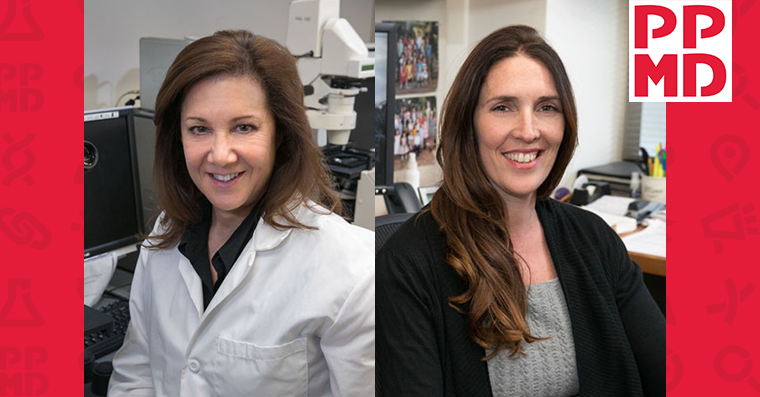
Parent Project Muscular Dystrophy (PPMD) is excited to announce that Drs. Melissa Spencer and April Pyle from the David Geffen School of Medicine at UCLA and the Center for Duchenne Muscular Dystrophy at University of California – Los Angeles (UCLA) is the recipient of a $175,000 grant to continue their work optimizing a CRISPR/Cas9 platform to treat people living with Duchenne.
Part of PPMD’s ongoing Gene Therapy Initiative, funding for this grant was a result of community support. Since the launch of the Initiative, PPMD has funded over $3 million in a variety of gene therapy and related approaches to several institutions, including micro-dystrophin gene transfer, CRISPR/Cas9, Dup2, and GALGT2, as well as research into the effects of gene therapy on the heart and potential immune responses gene therapy may provoke.
Duchenne is the most common fatal genetic disorder diagnosed in childhood, affecting approximately one in 5,000 live male births. Duchenne is caused by a change in the dystrophin gene. Gene therapy for Duchenne is centered on the goal of successfully introducing a smaller, but efficient version of dystrophin into the muscle cell. There are numerous drugs currently in development with the aim to treat Duchenne, a subset of those therapeutics include dystrophin replacement strategies such as CRISPR technologies to edit the DMD gene. Current CRIPSR strategies, similar to exon skipping or micro-dystrophin gene therapy, seek to provide muscle cells a shortened form of the dystrophin protein.
When asked how CRISPR technology could be used to treat Duchenne, Abby Bronson, PPMD’s Senior Vice President of Research Strategy, explains: “There are two main components to CRISPR. One is Cas9, a protein that acts as the molecular scissors to cut DNA. Second is RNA, which acts as a guide that specifies where Cas9 should cut DNA in the cell. Using CRISPR, gene editing has the potential to permanently exon skip or correct small mutations in a gene. At its current stage in development, CRISPR requires further optimization and safety profiling and we remain positive about it’s potential. PPMD is proud to support UCLA’s ongoing exploration of this technology under the direction of Drs. Spencer and Pyle.”
Dr. Spencer says she and her team are grateful for this recognition and feel hopeful that this research will help determine the potential of CRISPR as a therapy: “Previous research performed by their co-mentored student Dr. Courtney Young at UCLA resulted in the design of a CRISPR/Cas9 platform which could modify the DMD gene allowing for production of a truncated dystrophin protein. This CRISPR/Cas9 platform would be applicable for mutations observed in almost half the Duchenne population and will help improve future CRISPR/Cas9 design. The biggest hurdle any potential therapeutic technology faces is in showing a level of safety and efficacy that warrants translation to human trials. Therefore optimizing these gene editing platforms is a foundational step to ensure they are safe for treating those with Duchenne. We appreciate PPMD’s support of this study and look forward to further optimizing and testing the CRISPR/Cas9 platform in Duchenne.”
This CRISPR/Cas9 platform results in the generation of a 45-55 deletion, a genotype that has been observed in milder Becker muscular dystrophy patients – a less severe muscular dystrophy that occurs when dystrophin is manufactured, but not in the normal form or amount. Due to the region being targeted, this deletion could be applied to a large number of those with Duchenne, specifically mutations in a hotspot between exons 44 and 56.
Dr. Spencer and her team are working on the following efficacy and safety improvements for CRISPR/Cas9:
- Designing and testing guide RNAs that may be more efficient. It is possible that reducing the size of deletion could yield improved efficiency of deletions. The alternate guides being tested in this effort would recapitulate deletions that are observed in mild Becker patients.
- Implementation of strategies to reduce Cas9 half-life. One major concern with CRISPR technologies is the off-target effects, or the cutting of DNA that is not the sequence of interest, which can cause harm. By reducing the amount of time Cas9 is active in a cell, the probability of off-target DNA cutting could be reduced.
- In addition to limiting the time Cas9 is active, a variant Cas9 protein with higher accuracy will be tested. This modified Cas9 has been reported to reduce off-target cutting while maintaining its activity. For both of these safety measures, efficacy will be evaluated to ensure these additions are not impeding the CRISPR/Cas9 platform’s performance.
Funding for this grant was made possible, in part, by Hope for Gus, a family foundation that, like PPMD, is on a mission to end Duchenne. “We are thrilled to be a part of this important research grant with PPMD,” said Tonya Dreher, Founder of Hope for Gus. “We firmly believe in finding opportunities for collaboration in order to continue exploring the potential of gene editing.”
Additional funding was provided by the PPMD community in support of the organization’s ongoing Gene Therapy Initiative.
Updates on this project, as well as other grants awarded as part of PPMD’s Gene Therapy Initiative, will be presented at the organization’s Annual Conference, June 26-30, in Orlando, FL.



 by: Parent Project Muscular Dystrophy
by: Parent Project Muscular Dystrophy

